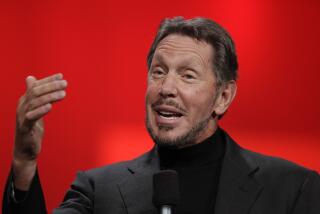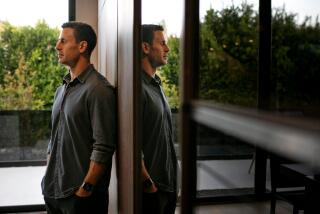Magnate Bets on Asian Casinos
- Share via
Sheldon Adelson, named the third-richest man in the U.S. last week by Forbes magazine, has set his sights on No. 1.
Adelson, who controls 69% of Las Vegas Sands Corp., has amassed a $20.5-billion fortune developing casinos and the Comdex computer industry show. He says it’s only a matter of time before he ends Microsoft Corp. founder Bill Gates’ 13-year domination of the Forbes list.
“I would set that as a goal and I think that’s achievable,” Adelson said in an interview Tuesday at the Venetian Resort Hotel Casino, the 4,000-room Las Vegas property his company owns. “I’ve already figured out when I’m going to be No. 2 and No. 1.”
The 73-year-old Adelson must first pass investor Warren E. Buffett, No. 2 on the list with $46 billion, before he can challenge Gates, who is worth $53 billion, according to Forbes.
Adelson’s success may hinge on Las Vegas Sands’ investments in Macao, the only region in China where gambling is legal.
The Sands Macao, open only two years, is already outperforming the Venetian, and next year Adelson will open the Venetian Macao as part of a complex of 20,000 hotel rooms and 3 million square feet of retail space on the Cotai Strip. In May, Las Vegas Sands also secured the rights to own and operate the first casino in Singapore.
“We’re in an obsolescence-proof business,” Adelson said. “We’re in the second-oldest business in history. We won in Macao, we won in Singapore and we’re the only ones with a couple of years of experience in the Asian market. There’s never been a real destination resort in Asia, and when we open the Venetian Macao, it will be the first.”
Adelson dismissed skeptics who say Chinese gamblers aren’t interested in the bells and whistles of Las Vegas-style resorts, with their spas, restaurants and shops. He pointed to the millions of potential tourists in Japan, South Korea and Southeast Asia and said they wanted the sort of entertainment that he planned to offer.
“In my entrepreneurial language, it’s a no-brainer,” he said. “It’s like bringing a blanket to someone on an ice floe or bringing water to someone in the desert.”
Adelson, the son of a Boston cab driver who immigrated from Lithuania, first saw the potential of casinos as a host for conventions when he ran Comdex. That led him to buy the Sands Hotel in 1989 for $128 million, giving him a property large enough to build his own convention center. He demolished the Sands to build the $1.5-billion Venetian in 1998.
He took Las Vegas Sands public in 2004, raising $690 million. The shares fell $1.33 to $66.57 on Wednesday. The stock has more than doubled since the initial public offering.
Also in the works for Las Vegas Sands are the development of Hengqin Island, near Macao, into a resort community and next year’s opening of the Palazzo addition to the Venetian, which will double the casino’s size. Adelson said he was looking for an opportunity in Europe for a large-scale development.
Although slowed by a nerve condition that forces him to use a walker, Adelson, who is Las Vegas Sands’ chairman and chief executive, said he planned to lead the company for the foreseeable future. He said his management team, led by President and Chief Operating Officer William P. Weidner, could step in if he became incapacitated.
“Why do I need succession planning?” he asked. “I’m very alert. I’m very vibrant. I have no intention to retire. If I were to retire, I would keep my family’s interest in the company the same and say, ‘Don’t sell.’ ”
More to Read
Inside the business of entertainment
The Wide Shot brings you news, analysis and insights on everything from streaming wars to production — and what it all means for the future.
You may occasionally receive promotional content from the Los Angeles Times.










